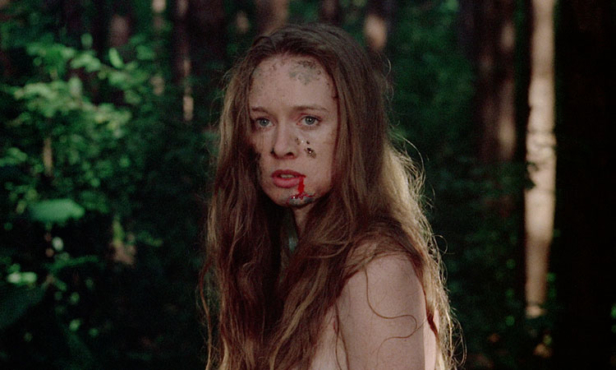Surrounded by controversy, intrigue and debate, the story behind I Spit On Your Grave is almost as interesting as the one portrayed on-screen. The 1978 movie written and directed by Meir Zarchi about a woman who gets her revenge after being raped has had a re-name, was banned when it was released and is still being discussed today.
Indeed, the shocking nature of how the movie started for Meir signifies what was to come… ”I think it’s very important for people to know that Meir Zarchi did stumble upon a victim of sexual assault and the horrifying aspect of that is that my sister, who was eight years old at the time, was with my father,” Terry Zachari, Meir’s son tells us. “They were going to play tennis on a rainy day along with his best friend and to come across… I can’t even imagine my sister having to come across and seeing that at her age. That must have left a big impact on her and it obviously left an impact on my father because he felt compelled to write a story about it, especially after taking that poor girl to the police station, thinking she would get help and instead they started questioning her over and over again.”
According to Meir, when he arrived at the police station with the young woman, the police officers there proceeded to barrage her with questions such as why she was on her own, why she was wearing what she was wearing, why she took that particular shortcut… ““It was a different kind of rape. It was a rape from the justice system,” Terry continues. “That really angered Meir and he made a script about it.”
Meir’s movie follows Jennifer Hills (Camille Keaton) who has decided to rent a cabin in Kent, Connecticut near the Housatonic River in the Litchfield County countryside to write her first novel. Upon entering the town she catches the eye of local men Johnny (a local gas station manager), Stanley, Andy and Matthew (who delivers groceries to her).
A few days later, while sunbathing in a canoe on the river, the men attack Jennifer, dragging her into the woods and repeatedly raping her. They then attack her again after she’s made her way back to her cabin and leave Matthew to kill her. Which he doesn’t.
It’s a decision Matthew would soon regret as Jennifer enacts her revenge on the four men, luring them one-by-one back to the cabin and murdering them. It’s a harrowing and horrific story, but the meanings behind it are very different to the ones audiences may be familiar with, as Terry explains: “The title [Meir] had was Day Of The Woman, not the exploitative I Spit On Your Grave, with that poster with the female holding the knife by the blade, looking bloodied and bruised. His Day Of The Woman poster had a completely different angle – there was no exploitative nature injected into the film when Meir had his hands on it.”
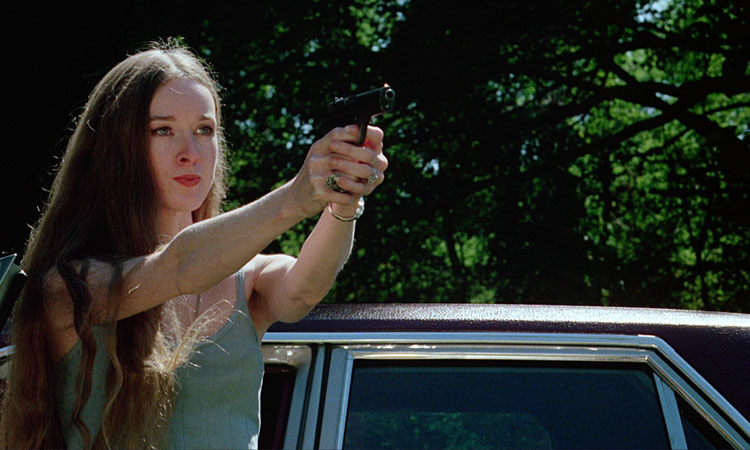
That poster and re-name came a few years later, after Meir unsuccessfully tried to release the movie himself. It was shown at a few select cinemas under Meir’s guidance but without too much traction. For many films, that may have been the end of the story. However, Day Of The Woman would have another chance to win people over – just not with that title… “The film as Day Of The Woman – it wasn’t getting around, it didn’t have that bite,” Terry explains. “Then [producer/distributor] Jerry Gross (who is a master at marketing) [took] Meir’s quiet, little unknown movie, Day Of The Woman and he changed the poster, changed the tagline, changed the title and suddenly it opened peoples’ eyes. So that just proved to me that marketing and titles and the look of the poster could make the difference between your movie being successful or your movie being six feet underground!”
When the movie was finally released, audiences and critics alike panned it. They accused the film of glorifying rape and called for the film to be banned. “[Gene] Siskel and [Robert] Ebert – two of the most powerful critics back in the Seventies and Eighties – attacked this movie,” Terry tells us. “They picketed in front of theatres begging people not to see this movie. They were begging owners of the theatres to pull the movie from the screen and they were successful. They did that. Those critics had a lot of power.”
Not only was the film pulled from American cinemas, but many countries from around the world also banned the film, including the UK where it became part of the ‘video nasty’ controversy during the Eighties whereby many low-budget exploitation films distributed on VHS were criticised for their violent content by the press, social commentators and religious organisations. However, it was on the VHS platform that I Spit On Your Grave really started the journey to being a movie we’re still speaking about 42 years later.
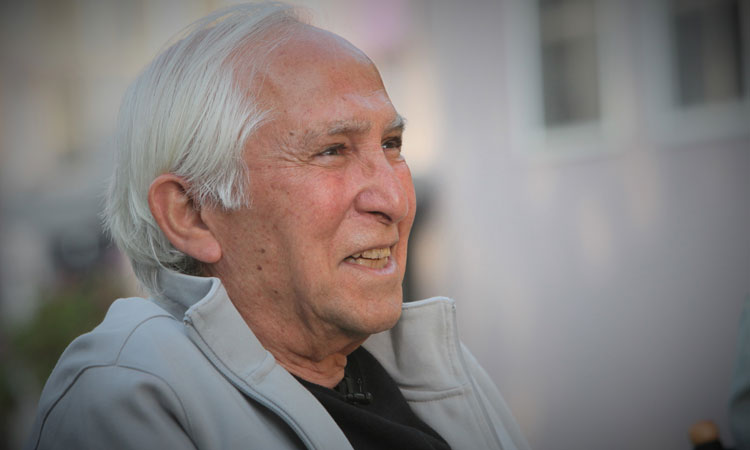
“Lo and behold the video industry came out a few months after they pulled the movie from the screens, then the people had the last word – and they’re still having their last words to this day!” Terry says. “I was living in New York City [at the time] and I was walking down the street one day passing by what was then a video store and there were maybe 100 boxes of I Spit On Your Grave for sale! And that’s when it struck me. Oh my goodness my father’s movie is right here in the store on Broadway of all places and it was selling like hot cakes. That was the beginning of me realising that my father had made a movie that is actually getting some recognition and it just never ended. It just kept going on and on. Even to this day, here we are.”
Certainly, I Spit On Your Grave has been called an exploitation film and even a feminist film, it’s been banned and it’s been revered as an iconic piece of cinema. Whatever the opinions, there’s no denying one thing: it will certainly get people talking. “This movie has a lot to say but people can interpret it in a lot of different ways,” Terry explains. “Maybe [even] in a different way to what Meir was trying to convey. However you convey this movie it’s fully acceptable – if you want to hate this movie I say hate it, you should hate it. If you want to love it for whatever reasons, that’s perfectly fine as well!
“The controversy is what keeps the movie alive. I always say that when a movie becomes a discussion off the screen it becomes bigger than the movie itself because it becomes a topic of discussion. And there’s a lot to talk about with this movie. You can call it a misogynistic film, you can say it’s a feminist movie. There are many ways to look at it and depending on your point of view and how you experience this film could really determine your opinions about it. I find that very fascinating.”
Terry was just nine years old when Meir was making the movie, so it’s been a big part of most of his life. In fact, Terry even had a bit part in the movie (as Johnny’s son) and has decided to tell the full story of the movie in his and Meir’s own words, with his documentary Growing Up With I Spit On Your Grave: “I decided to do the documentary because I felt that I had a story to tell,” Terry tells us. “I really wanted people to hear beyond and above what they were reading about in the countless reviews that are out there. I wanted to share what I could tell about the story.
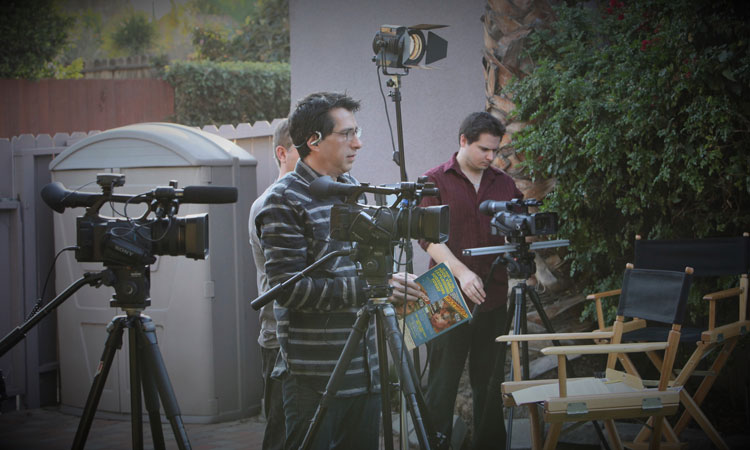
“Originally I thought I was only going to film Meir and I had a whole different title. I called it I Spit On Your Grave: The Man And Madness Behind It All. It was going to be all about me interviewing Meir. Then after I filmed three separate interviews with Meir, suddenly I said: ‘I gotta get Camille, I have to get Camille Keaton!’”
Playing the role of Jennifer, Camille Keaton successfully embodies both the hunted and the hunter in the movie, and in Terry’s documentary, reveals that she was completely on-board with Meir’s idea. “This movie wouldn’t be the same if it wasn’t for her performance,” Terry says. “She really delivered. Me, personally when I watch the film, I believe every horrific thing that is happening to her and I feel her pain. The way she handled that role was so brilliant and had Camille been a well-known superstar at the time, she would be getting accolades and awards but the subject matter is so brutal that people are afraid to approach this movie with any sort of awards. But Camille really knocked it out the park with her performance. I think she equally is responsible for the success of this movie for sure.”
Both Meir and Camille connected on both the movie and with each other while filming ISOYG – marrying not long after shooting wrapped up (though divorcing some years later). Luckily, that connection meant Camille would be more than up for joining Terry on his documentary: “I’m like ‘yeah she’s my step mum of course she’ll do this’ and she full-heartedly agreed to do it! Then once I had Camille I said: “Oh my goodness I have to get the four men” – then I reached out and got lucky enough to get Gunter Kleeman [who played Andy] and Ron Shetler aka Eron Tabor [who played Jonny].
“I also found the production manager from the movie and I got the director of photography, Nouri Haviv, to make a vocal appearance in the film. That was really heart touching because six months afterwards Nouri passed away and as you know in the documentary Meir and Nouri spoke about Nouri coming back and filming the sequel so that was sad for me.”
What really comes through from the documentary is that the cast and crew have fond memories from working on ISOYG and just like watching the movie itself, is an experience that has stayed with them many years later.
“I don’t think Meir thought the movie would last maybe five years at the most,” Terry reveals. “Remember back in those days there was no such thing as the video market. Your movie was either going to play in the theatres or on television. I don’t think Meir ever thought it would happen but there are a lot of filmmakers that use I Spit On Your Grave as a vehicle for how they want their movie to perhaps come across. But I find that I Spit On Your Grave really does stand alone in terms of shock value. Movies that are made today are too modernised and they’re too slick. I love the remake. The remake was really well done and Steven Monroe did a really great job but there’s something about the original that has that rawness to it, that documentary sort of approach to it. That innocent approach to this brutal subject does make it even more horrifying in a way. Because there’s not that Hollywood gloss.”
Indeed, I Spit On Your Grave had its very own remake in 2010, a move that’s put the original film on the radar of a whole new generation, as Terry explains: “When the remake came out a lot of youngsters in their twenties and thirties that may have never heard of the older film, suddenly it brought it to their attention and [they were] seeing the remake and seeing the original.”
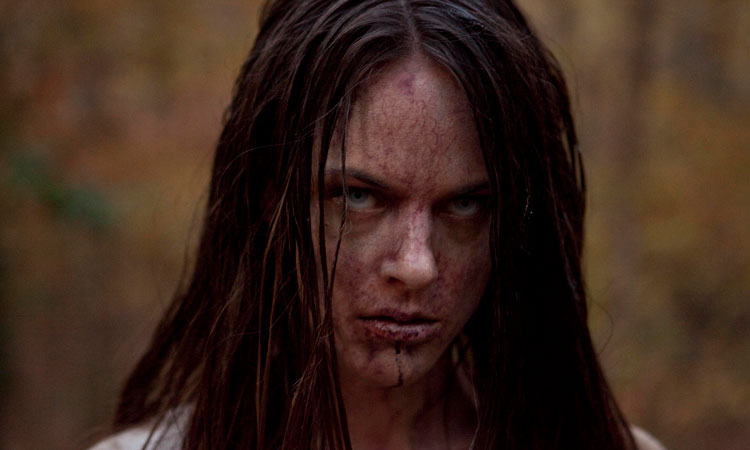
The remake was so successful that it got its own sequel and then a third instalment: “When part two came out, that was when I realised, I had to make my documentary,” Terry says. “I went with Meir to a meeting with Paul Hertzberg and Lisa Hansen of CineTel films and they were discussing with Meir that they wanted to do a Part Two and that’s when it struck me: Boy they want to keep on making more of these Spit movies. Well I’m going to make a documentary about this – I have to share my story. There’s so much more to tell.”
Having I Spit On Your Grave on people’s minds today has also meant that the movie is looked at in a different way to when it was in the Seventies, especially when talking openly about sexual aggression and violence: “With the whole #metoo movement and rape culture I think this movie was ahead of its time,” says Terry. “It wasn’t glorifying rape, it wasn’t staying away from it. It wasn’t like your typical Hollywood movie, where a female is going to be raped, we cut to dark, we hear a scream and then we cut to the next morning where she’s shaking and recuperating. Meir shows you 25 minutes of non stop brutality and I think it really brings out the true ugliness of what sexual violence is. And the fantasy of adding the revenge part I think is only empowering.
“I really want people to understand that there’s more to what you’re seeing on the screen, that there are people involved in the making of this film that just really came together back in the days when there was no video, there was no internet. It was all about the love of filmmaking and they got together and made this little movie, not knowing what would happen to it. That’s the beauty of it.”
So enduring is I Spit On Your Grave, that the franchise is now getting a six-disc collector’s edition box set complete with the original I Spit On Your Grave, the remake and its two sequels, as well as Growing Up With I Spit On Your Grave and the latest addition to the franchise: I Spit On Your Grave: Déjà Vu, which heralds Meir’s return to the series – writing a directing a direct sequel to his original film.
Taking place 40 years after the events of the 1978 film, Jennifer Hills (with Camille Keaton back in the role) has written a memoir of her time in Kent, Connecticut, but the family of Jennifer’s victims want their revenge, kidnapping her and daughter Christy (Jamie Bernadette) and taking them back to the town where it all began…
“Meir originally wanted to make the sequel long before the remake was done,” Terry says. “Meir always wanted to do that and I’m sure that the script must have changed throughout the years because 20 years ago Jennifer Hills wouldn’t be able to have a daughter the age of Christy! So here we are – the three [Noughties] movies were made and I knew it was time for Meir to do Deja Vu. We basically gave Meir the stage to take his time and to just do what he wants in order to make the movie that he wanted to make. I was so honoured and grateful that Camille Keaton agreed to reprise her role and having Meir Zarchi and Camille Keaton again share their names in a sequel to a notorious film like I Spit On Your Grave to me was a joy to be a part of. And I’m so happy that he was able to do it.”
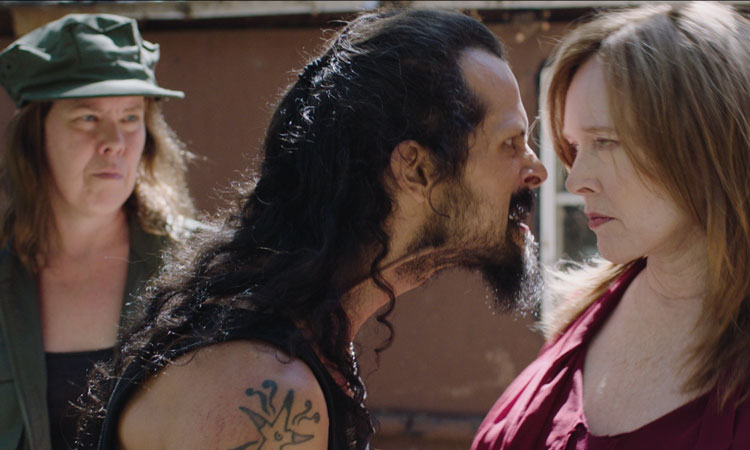
This time around, Terry doesn’t just have a bit part in his father’s film: “I produced it along with Jan O’Connell our line producer who’s an unbelievable force of power,” he says. “The two of us produced the film together and I ended up editing the movie. I spent probably about 19 months editing this film, bringing it to Meir’s liking. I was deeply involved even from casting. It just became my life for about three and a half years!”
It seems strange that a film with such subject matter has been a part of Terry’s life and childhood, but yet again, as with pretty much all aspects of this film – it has certainly stayed with him: “It’s been a really wild ride! I grew up with the film as a child so it was very difficult for me to understand the context of what’s really happening on the screen. I first really saw the film when I was about 14 or 15 years old and it shocked me. I think I was more horrified that my father made a movie with all this violence and brutality and then as I got older, especially then hearing all the reviews from people either side of the fence, it struck me that my father made something bigger that he even thought. So yeah it’s been a wild ride. I believe that even today people are seeing the same movie that people 40 years ago were watching. I listen to podcasts a lot about the subject and it’s amazing the different takes people have on the film even today.
“When I was growing up with the film I really did not realise the depths of what it was about and how it affected people. It took me a while. It’s a movie that as a child it’s very hard to figure out because sex and rape and all that is nowhere in the radar of a child’s mind so it did take me a while to figure it out. I’m still figuring it out today!”
Love it or loathe it, you’ve almost certainly heard of I Spit On Your Grave and you’ll probably be hearing more about it again soon… “The blu ray for Déjà Vu hit number two on the Amazon charts so I was really happy about that,” he enthuses. “I always say, there’s more Spit to come for sure, without a doubt!”
Kaleidoscope Home Entertainment presents I Spit on Your Grave on 4K Ultra HD + Blu-ray from 26th September. Order here.
